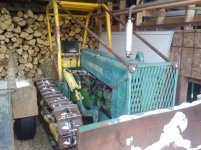I think you are referring to the rops and cage protection a dozer can provide and I cannot say I disagree with you in the least on this point. However there is part of your statement that I believe needs quantifying in that you think that this dozer is the "safest" method for what this individual is doing (logging). Dozers can give one a feeling of invincibility and this can lend into a false sense of security. On uneven terrain and an unexperienced operator, they can be one of the deadliest pieces of equipment in a woods setting. Dozers are not all that stable on uneven or ground obstructed land as nothing articulates on a dozer. Once a dozer obtains a certain threshold, it can go over very easily. A small dozers track is not that wide and a dozer tends to commit fully on whatever one side happens to step on so to speak as it entire track is one continuous line. If one is bringing a dozer into the woods, one has to be extremely aware of ground formation to a higher degree than bringing a tractor into the woods. Part of the reason my boss got rid of the one he had was because it got into some pretty dicey situations that if there were going to be driven by several operators, he did not care to take a chance with. Tread carefully with a dozer in the woods.
